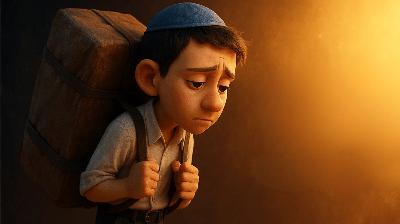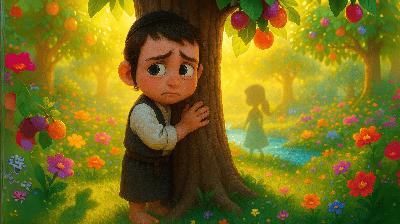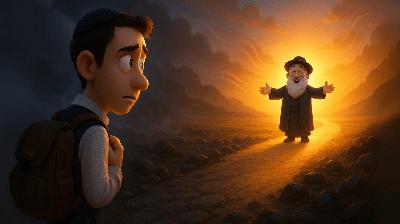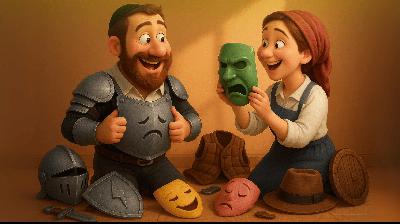Discover Weekly Women's Class by Rabbi YY Jacobson
Weekly Women's Class by Rabbi YY Jacobson

174 Episodes
Reverse
How Do I Know Why My Soul Came Down? Liberating Myself from Social StereotypesThis class was presented by Rabbi YY Jacobson on Tuesday, 16 Shevat, 5786, February 3, 2026, Parshas Yisro, at The Barn @ 84 Viola Rd. in Montebello, NY.View Source Sheets: https://portal.theyeshiva.net/api/source-sheets/9864
Pharaoh and His 3 Henchmen: When You Know Your Nervous System, You Can Live with Agency, Presence, and RegulationThis class was presented by Rabbi YY Jacobson on Tuesday, 2 Shevat, 5786, January 20, 2026, Parshas Bo, at The Barn @ 84 Viola Rd. in Montebello, NY.View Source Sheets: https://portal.theyeshiva.net/api/source-sheets/9855
Pharaoh Was Searching for a Miracle that Would Blow Away Moshe and AaronThis class was presented by Rabbi YY Jacobson on Tuesday, Parshas Vaera, 24 Teves, 5786, January 13, 2026, at The Barn @ 84 Viola Rd. in Montebello, NY.
A Peek Into Moshe's Mind: The Day You Stop Living for Others and Go Into Flow with Your Own EnergyThis class was presented by Rabbi YY Jacobson on Tuesday, Parshas Shemos, 17 Teves, 5786, January 6, 2026, at The Barn @ 84 Viola Rd. in Montebello, NY.View Source Sheets: https://portal.theyeshiva.net/api/source-sheets/9849
Refusing to Live Behind Walls: When Jerusalem and My Soul Are Under SiegeThis class, explaining the historic story behind the fast of the 10th of Teves and its psychological relevance in our lives today, was presented by Rabbi YY Jacobson on Tuesday, 10 Teves, 5786, December 30, 2025, at The Barn @ 84 Viola Rd. in Montebello, NY.View Source Sheets: https://portal.theyeshiva.net/api/source-sheets/9839
Why the Chanukah Struggle Is Still Going On: Can I Choose Experience over Reason?This class was presented by Rabbi YY Jacobson on Tuesday, 26 Kislev, 5786, December 16, 2025, Parshas Miketz, at The Barn @ 84 Viola Rd. in Montebello, NY.View Source Sheets: https://portal.theyeshiva.net/api/source-sheets/9830
Your Soul Craves Authentic Tranquility; That’s When Things Begin to Fall ApartThis class was presented by Rabbi YY Jacobson on Tuesday, 19 Kislev, 5786, December 9, 2025, Parshas Vayeshev, at The Barn @ 84 Viola Rd. in Montebello, NY.
The class explores the reason for the name of the parsha, "Vayeishev," which means "settling down," when the entire portion records the collapse of the first Jewish family. And how can one grasp the words of the Midrash and Rashi that Yaakov was supposedly punished for craving to enjoy tranquility in his life? It seems so cruel.
The class is based on an address by the Lubavitcher Rebbe, forty years ago, Shabbos Vayeishev 5746 (1985). We discover the meaning of authentic serenity and how to achieve it in life. Sometimes, when your life and family begin to unravel, healing has begun.View Source Sheets: https://portal.theyeshiva.net/api/source-sheets/9827
"And Yaakov Remained Alone:" As You Heal, Some Will Shun You While Others Will Embrace YouThis class was presented by Rabbi YY Jacobson on Tuesday, 12 Kislev, 5786, December 2, 2025, Parshas Vayishlach, at The Barn @ 84 Viola Rd. in Montebello, NY.View Source Sheets: https://portal.theyeshiva.net/api/source-sheets/9823
"Every Liar Has a Teacher:" Why Yaakov Had to Marry LeahThis class was presented by Rabbi YY Jacobson on Tuesday, 5 Kislev, 5786, November 25, 2025, Parshas Vayetzei, at The Barn @ 84 Viola Rd. in Montebello, NY.
The Medrash describes a hidden scene on the wedding night of Yaakov and Leah. Throughout the night, Yaakov kept calling the bride “Rachel,” and Leah answered each time. In the morning, when the deception was revealed, Yaakov confronted her: “How could you answer to the name Rachel? You are just like your father, Lavan—a deceiver!” Leah replied with the shocking line: “Is there a barber without students? Didn’t your father call for Esav, and you answered ‘I am Esav’?” At first glance, Leah appears to justify deception with deception—but that cannot be the message. The matriarch of Klal Yisrael wouldn’t base righteousness on revenge or moral equivalence.
To understand her words, the shiur introduces a profound idea. The Torah writes “הִיא לֵאָה” (“she is Leah”) but spells it “הוּא לֵאָה” (“he is Leah”), hinting that Yaakov’s shock that morning was not simply discovering who Leah was, but discovering who he was. Leah became a mirror. When Yaakov deceived Yitzchak by dressing as Esav, he spiritually adopted the role of Esav—not in wickedness, but because Hashem needed him to carry both types of Jewish souls: those of pure light (Rachel) and those who struggle, fall, rise, and wrestle their way to greatness (Leah/Esav archetype). The moment Yaakov declared “I am Esav,” he entered the world of struggle—which meant the soulmate for that part of him was no longer Rachel alone, but Leah, who embodies exhaustion, complexity, and inner confrontation.
Thus, Leah’s response was not defensive sarcasm but a deep revelation: “I didn’t merely deceive you; I stepped into the place you created. You became Esav for a holy purpose—and therefore, your Esav-part must marry its counterpart. I am the mirror of the struggle inside you.” In this view, the switch under the chuppah wasn’t random trickery. It was a continuation of Yaakov’s own spiritual journey. Rachel represents his light, innocence, and clarity; Leah represents his darkness that can be transformed into light—the hard inner work, the exhaustion, the buried pain, the shadow that must be redeemed to access deeper strength.
Ultimately every Jew descends from both Rachel and Leah—both the part of us that feels aligned and luminous and the part that feels heavy, complicated, and exhausted. True wholeness comes only when both are embraced. That is why Yaakov is buried with Leah, not Rachel. His life’s completion came not only from the parts that felt easy and beautiful, but from the parts that demanded courage, mirroring, self-confrontation, and transformation. The message of the Medrash is that our “Leah moments”—our struggles, shadows, and discomfort—are not punishments but invitations to greatness. And that is the deeper meaning of the badeken: by veiling the kallah, we declare, “I am ready to marry not only the parts of you that I see now, but also the hidden parts I cannot yet see — and this commitment is only possible if I am also willing to meet, accept, and marry the hidden parts within myself.”View Source Sheets: https://portal.theyeshiva.net/api/source-sheets/9817
When You Grasp the Dynamics of Your Two Souls, You Liberate Yourself from ShameThis class was presented by Rabbi YY Jacobson on Tuesday, 27 Cheshvan, 5786, November 18, 2025, Parshas Toldos, at The Barn @ 84 Viola Rd. in Montebello, NY.View Source Sheets: https://portal.theyeshiva.net/api/source-sheets/9813
Don't Run from Your Mistakes: Why the First Jewish Child Was Named LaughterThis class was presented by Rabbi YY Jacobson on Tuesday, 13 Cheshvan, 5786, November 4, 2025, Parshas Vayera, at The Barn @ 84 Viola Rd. in Montebello, NY.
Why would Sarah deny the truth that she laughed? The Torah says, “because she was afraid.” Afraid of whom? Why was she afraid to tell Abraham that she laughed? After all, she was 89 years old, and Sarah stood her own in the presence of Abraham.
Maybe the Torah means she was scared of G-d. But that is senseless. Did she believe that you can hide from G-d?
Even more strange is the response to her denial. “But He said, ‘No, you laughed indeed.’” What was this all about? A he said/she said game in the therapist’s office? She said I never laughed; he says: No you did laugh! Okay great. Now what?
The biggest question is this: When this miracle child is actually born, the name he receives is Yitzchak, which means LAUGHTER! Sarah said, “God has brought me laughter; everyone who hears will laugh with me!”
Strange. When Sarah hears she will have a child, she laughs. G-d gets upset over the fact that she is laughing. He confronts Abraham about her laughter. She denies it. Then Abraham, or G-d, says: No, you did laugh, Sarah! And then when the baby was born, they gave him that very name—laughter!
There seems to be some strange theme unfolding here.
One of the Chassidic masters, the Sefas Emes, provides a marvelous commentary. It was the moment that created the eternal and legendary Yiddishe Mamme, who will stop for nothing to protect and to believe in her children, and offer them the maternal holding, the fit of inner regulation, peace, and self-love.
Cynicism undermines our feminine energy in very profound ways. It buries our trust. Our mother Sarah needed not only to avoid it, but to transform it. View Source Sheets: https://portal.theyeshiva.net/api/source-sheets/9789
The Journey from Trauma to Trust; When I Need to Cover My Eyes In Order to SeeThis class was presented on Tuesday, 6 Cheshvan, 5786, October 28, 2025, Parshas Lech Lecha, at The Barn @ 84 Viola Rd. in Montebello, NY.View Source Sheets: https://portal.theyeshiva.net/api/source-sheets/9784
Noach Before Toldos: Showing Up for Our Children and the World from a Space of Internal CalmThis class was presented on Tuesday, 29 Tishrei, 5786, October 21, 2025, Parshas Noach, at The Barn @ 84 Viola Rd. in Montebello, NY.View Source Sheets: https://portal.theyeshiva.net/api/source-sheets/9781
Don’t Do Teshuvah Because You Hate Yourself; Do Teshuvah Because You Love YourselfThis class was presented on Tuesday, 8 Tishrei, 5786, September 30, 2025, Parshas Ha'azinu, at The Barn @ 84 Viola Rd. in Montebello, NY.View Source Sheets: https://portal.theyeshiva.net/api/source-sheets/9771
Coronating the King: Bringing Hashem into the Most Shameful, Lonely Parts of Your BeingThis class was presented on Tuesday, 23 Elul, 5785, September 16, 2025, Parshas Nitzavim, at The Barn @ 84 Viola Rd. in Montebello, NY.
We explore the first question asked by G-d to Adam on the first Rosh Hashanah of history: Ayeka, where are you? He did not ask him why he sinned and ate from the tree of knowledge; he asked him: Why do you need to hide from me? Can you come out of your hiding place so we can enjoy the garden together?
We analyze the inner fear and shame that paralyze so many of us, and deprive us of the ability to experience internal love and bliss. The coronation of Hashem on Rosh Hashanah is the invitation to bring infinite Divine acceptance into those very shameful and scary places. The life-changing experience of embracing all our parts and allowing the love to flow freely and uninhibitedly.View Source Sheets: https://portal.theyeshiva.net/api/source-sheets/9767
Elul & Rosh Hashanah Without Anxiety: Is Chassidus Really About Healing Trauma?This class was presented on Tuesday, 16 Elul, 5785, September 9, 2025, Parshas Ki Savo, at The Barn @ 84 Viola Rd. in Montebello, NY.View Source Sheets: https://portal.theyeshiva.net/api/source-sheets/9761
Can You Communicate Without Defensiveness? The Incredible Lesson of Shimon Hamsoni and Rabbe AkivaThis class was presented on Tuesday, 11 Av, 5785, August 5, 2025, Parshas Vaeschanan, at The Barn in Montebello, NY.
There is a story in the Talmud, in which Shimon the Imsonite retracts his entire theory that the term "Es" indicates the inclusion of another person or item, due to a single verse in this week’s portion, “You shall fear -- Es -- the Lord your G-d.” How can we be in awe of anybody but G-d? Yet his student, Rabbi Akiva, rescues his teacher’s refuted theory.
The obvious question is what did Rabbi Akiva discover which Shimon did not? Shimon could not entertain the notion of including anything in the commandment to fear G-d. For him, such a proposition would be blasphemy. Why did Rabbi Akiva, then, not have a problem of adding Torah scholars to the mitzvah of fearing G-d? How is it that for what Shimon was blasphemy was for Rabbi Akiva perfectly acceptable, and even a mitzvah?!
You were selected to win the Nobel Prize for your contribution to physics. You received your tickets to Norway to attend the lavish ceremony. You were featured on the cover of Time magazine, and have been interviewed by hundreds of journals and networks. Minutes after you received the call that the Nobel Committee had chosen you from 40 possible candidates, you went from being an anonymous physicist spending the last 45 years in a laboratory to becoming a world-class scientist whose name will be immortalized in the annals of scientific innovation and discovery. You become a household name. The world is buzzing with your praise.
And then… the unthinkable happens. Hours before you go to the airport to fly to Norway, you discover a subtle mistake in one of your 20,000 equations. It is a mistake that no eye has perceived and perhaps will not be perceived for many years. But it is a mistake. Your calculation is erroneous. You have refuted your discovery. You now have a choice to make. Will you allow the “small truth” to destroy your eternal glory? What would you do?
It is such a story that the Talmud is addressing. If only we can internalize this type of integrity our lives can be transformed.View Source Sheets: https://portal.theyeshiva.net/api/source-sheets/9744
When the False Moshiach Came to the Baal Shem Tov for Healing; When Unkelus Raised Titus, Baalam, and Yeshu from the GraveThis class was presented on Tuesday, 4 Av, 5785, July 29, 2025, Parshas Devarim, at a new location, The Barn @ 84 Viola Rd. in Montebello, NY.
The class tells the incredible story of Unkelus, who raised three people from the grave: Titus, Balaam, and Yeshu. What the Maharal and Reb Tzadok explain about the core of the Jewish soul, and how we must never confuse our blockages with our essence.
We explain the downfall of Yeshu and Shabti Tzvi, and the incredible story of the false Messiah coming to the Baal Shem Tov for spiritual healing.
We discuss how to view our struggling children and students who may be engulfed in confusion and pain.View Source Sheets: https://portal.theyeshiva.net/api/source-sheets/9740
Consciousness Has Been Upgraded; Are You Ready? Learning How to Trust Your Inner Divine Voice
This class was presented on Tuesday, 12 Tammuz, 5785, July 8, 2025, Parshas Balak, at a new location, The Barn @ 84 Viola Rd. in Montebello, NY.
View Source Sheets: https://portal.theyeshiva.net/api/source-sheets/9728
Moshe Was Told He Couldn’t Enter the Land, So We Discovered the Holiness of Our CravingsThis class was presented on Tuesday, 5 Tammuz, 5785, July 1, 2025, Parshas Chukas, at a new location, The Barn @ 84 Viola Rd. in Montebello, NY.View Source Sheets: https://portal.theyeshiva.net/api/source-sheets/9720
























